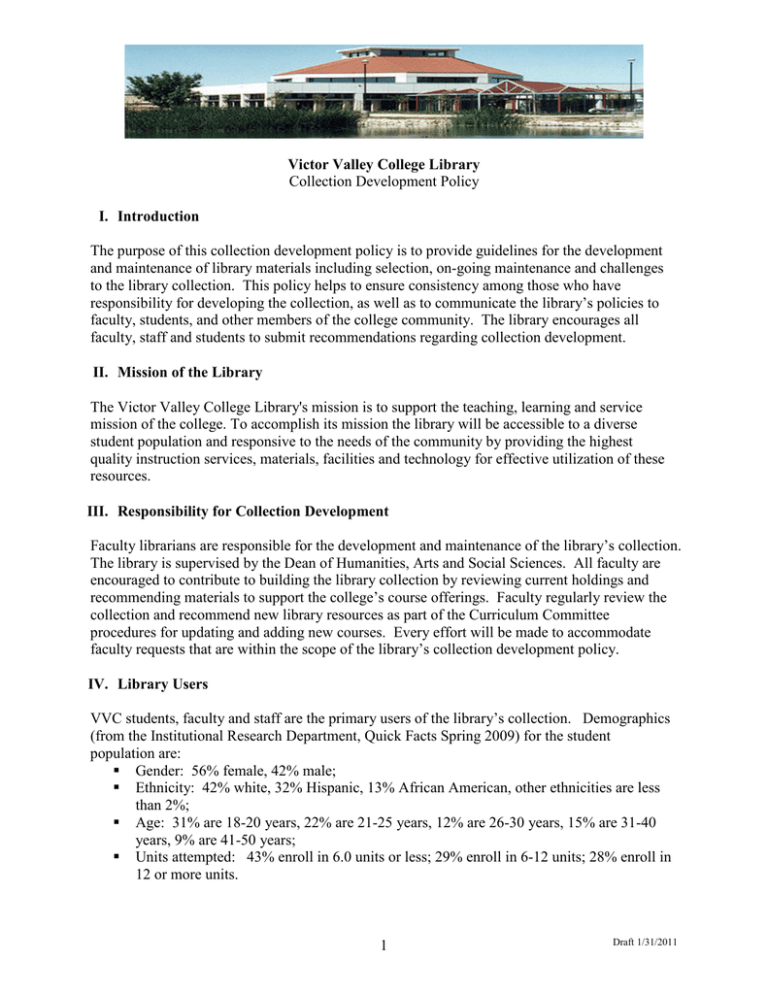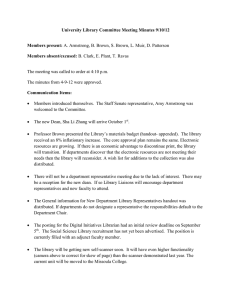Collection Development Policy Victor Valley College Library
advertisement

Victor Valley College Library Collection Development Policy I. Introduction The purpose of this collection development policy is to provide guidelines for the development and maintenance of library materials including selection, on-going maintenance and challenges to the library collection. This policy helps to ensure consistency among those who have responsibility for developing the collection, as well as to communicate the library’s policies to faculty, students, and other members of the college community. The library encourages all faculty, staff and students to submit recommendations regarding collection development. II. Mission of the Library The Victor Valley College Library's mission is to support the teaching, learning and service mission of the college. To accomplish its mission the library will be accessible to a diverse student population and responsive to the needs of the community by providing the highest quality instruction services, materials, facilities and technology for effective utilization of these resources. III. Responsibility for Collection Development Faculty librarians are responsible for the development and maintenance of the library’s collection. The library is supervised by the Dean of Humanities, Arts and Social Sciences. All faculty are encouraged to contribute to building the library collection by reviewing current holdings and recommending materials to support the college’s course offerings. Faculty regularly review the collection and recommend new library resources as part of the Curriculum Committee procedures for updating and adding new courses. Every effort will be made to accommodate faculty requests that are within the scope of the library’s collection development policy. IV. Library Users VVC students, faculty and staff are the primary users of the library’s collection. Demographics (from the Institutional Research Department, Quick Facts Spring 2009) for the student population are: Gender: 56% female, 42% male; Ethnicity: 42% white, 32% Hispanic, 13% African American, other ethnicities are less than 2%; Age: 31% are 18-20 years, 22% are 21-25 years, 12% are 26-30 years, 15% are 31-40 years, 9% are 41-50 years; Units attempted: 43% enroll in 6.0 units or less; 29% enroll in 6-12 units; 28% enroll in 12 or more units. 1 Draft 1/31/2011 As the only academic library in the Victor Valley high desert area, the library is used by a secondary group including local high school students, other college students, and community residents who may check out materials by joining the Friends of the Library. V. Scope The collection supports the community college undergraduate curriculum for general education, basic skills, English as a Second Language, and a variety of vocational programs offered by the college. VI. General Guidelines for Selections Materials are selected based on need, suitability, availability and/or cost, according to whether the material is: 1) ESSENTIAL Includes the core collection essential for a community college library and the specialized materials needed by students for their lower-division level research. 2) IMPORTANT/EDUCATIONAL Less closely related to existing instruction, but facilitates and enriches course work, or includes general educational resources in subject not covered by specific classroom instruction. 3) USEFUL Not basic or central instruction. May fulfill individual needs but is likely to be highly specialized. 4) MARGINAL Not necessary or appropriate. VII. Criteria for Acquisitions The following criteria should be considered when acquiring materials. General criteria for library acquisitions: 1) High quality in scholarship, authoritative, content format, literary merit. 2) Permanent value. 3) Currency and timeliness of the information. 4) Appropriateness for community college use. 5) Balance of current holdings—representative materials on all sides of an issue. 6) Value as a classic or outstanding work in a field. Additional criteria for books: 1) Reviews in relevant sources, such as academic or trade journals of the field, or library review aids such as Library Journal or Booklist. 2 Draft 1/31/2011 2) Fiction should be selected with an emphasis on its use in the formal study of literature or its impact on social and political thought, philosophical ideas, and wider values or contemporary relevancy. 3) Hardcover editions should be preferred over paperbacks. 4) Textbooks adopted for classroom use should not be purchased unless they are classics in the field. This does not exclude other monographs selected by instructors for classroom assignments. 5) In general, the library does not acquire multiple copies of the same materials. Multiple copies of faculty requests or donations of popular titles may be added. Additional criteria for serials: In addition to the general criteria for library acquisitions, the following specific requirements should be considered for serials purchase: 1) Academic journals are preferred over popular or general magazine titles. 2) Journals which do not support a specific element of the curriculum may be purchased if they contribute to the general liberal education of students by presenting an informed discussion of public affairs, economic, social, or political events, scientific or technical knowledge, literature, criticism, or the arts. Additional criteria for electronic resources: The library is responsible for maintaining online database subscriptions, whether or not grants and state categorical funding support them. Librarians will evaluate each database, review its statistical usage, and determine the continuation of its subscription at a time of renewal. A database that has not been frequently used may be discontinued. The library participates in the Community College Library Consortium for purchasing database subscriptions when possible. Selection criteria for databases include: 1) 2) 3) 4) 5) 6) Curriculum and Research Relevant Content/Format Search Interface User Support Availability/Accessibility of Service Cost VIII. Donation Policy Donations are added only when they strengthen the collection and impose no significant limitations on housing, handling, or disposition of duplicate or damaged items. Guidelines for evaluation of donations are the same as those for selecting purchased materials. Donated items accepted but not added to the collection will be added to the Friends of the Library annual book sale. The library will not issue appraisals of donated items for tax or any other purpose. 3 Draft 1/31/2011 IX. Maintenance of the Collection Weeding Weeding is the withdrawing of damaged or obsolete materials from the library’s collection, a process which is an integral part of collection development and maintenance. In general, the same criteria apply to weeding as apply to the selection of new materials. Additional criteria include: currency; appearance; condition; duplication; superseded editions; usage. Lost Items and Replacements Resources that are missing, lost, or withdrawn due to deterioration are not automatically replaced. Materials may be replaced based on the following criteria: 1) Importance of the item to the collection. 2) Demand for the material. 3) Availability. X. Resource Sharing The library’s membership in OCLC provides shared resources through interlibrary loan (ILL) for current students, faculty and staff. ILL is intended for academic research and is limited to items that are not part of the VVC library collection. The library is a member of the Inland Empire Academic Libraries Cooperative (IEALC,) which provides current students with borrowing privileges at 18 college and university libraries in the local region, including California State University at San Bernardino. XI. Academic Freedom The library upholds the American Library Association’s guiding principles related to patrons’ rights, including the “Library Bill of Rights,” “Freedom to Read Statement,” and “Intellectual Freedom Principles for Academic Libraries” policies. The collection is available to all potential patrons of the library, and should offer diverse viewpoints, regardless of the popularity of those perspectives, or of the sex, religion, political philosophy, or national origin of their authors. No censorship will be exercised on the basis of frankness of language or the controversial manner an author may use in dealing with religious, political, sexual, social, economic, scientific, or moral issues. 4 Draft 1/31/2011 XII. ALA REQUEST FOR RECONSIDERATION OF LIBRARY RESOURCES The Dean of Humanities, Arts and Social Sciences is responsible for the daily operation of the library. The dean has delegated the responsibility for selection and evaluation of library resources to the librarians. If you wish to request reconsideration of library resources, please return the completed form to the Dean of Humanities, Arts and Social Sciences. Name __________________________________ Date_________________________ Address______________________________________________________________ City, State, Zip_________________________________________________________ Phone _______________________________________________________________ Do you represent self? ____ Organization? ____ 1. Resource on which you are commenting: Title ______________________________________________________________ Author/Producer _____________________________________________________ ____Book ____Textbook ____Video ____Display ____Magazine ____Library Program ____Audio Recording ____Newspaper ____Electronic information (please specify) ____Other 2. What brought this resource to your attention? 3. Have you examined the entire resource? 4. What concerns you about the resource? (use other side or additional pages if necessary) 5. Are there resource(s) you suggest to provide additional information and/or other viewpoints on this topic? 5 Draft 1/31/2011


